A Woman’s Work
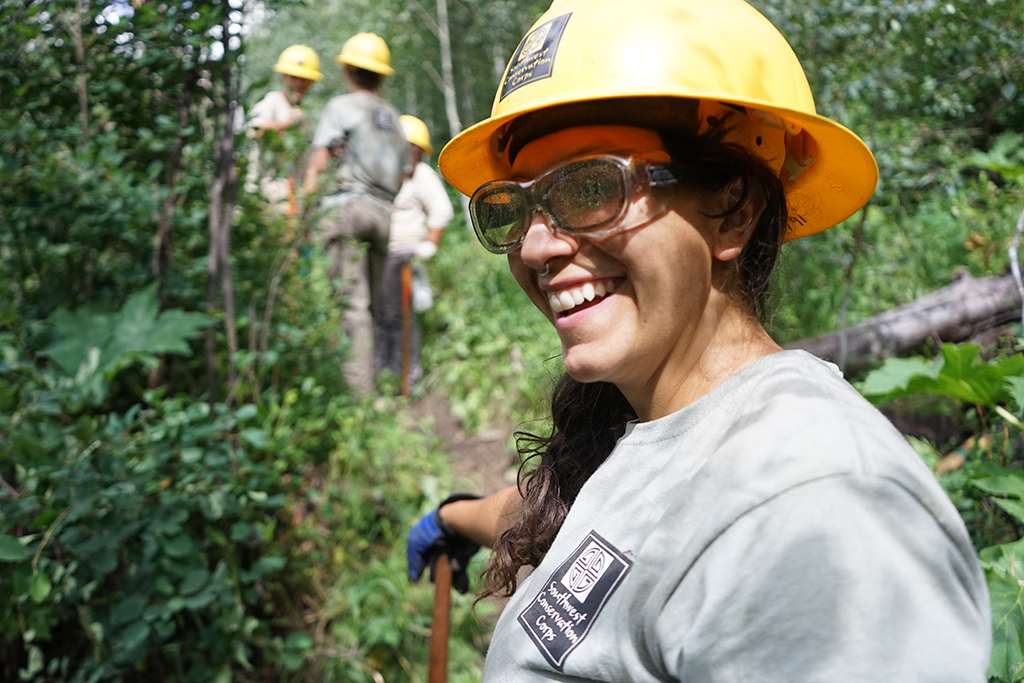
A Woman’s Work
By Sarah Hamilton
Under my nails lies a constant layer of grime, the pungent stench of my own aroma has become a perfume, the tan I’ve been sporting is just dirt in disguise, and the actual tan underneath outlines the negative space of my t-shirt. I haven’t seen my own face save for in the reflection of your shiny protective eyewear: out here I may not feel clean, but out here I feel like a woman.
What follows is a visual gathering of women who work on public lands– swinging picks, taking down trees, and working 10 hour days– and their thoughts on trails, stewardship, and feminism. These women are strong, not just physically, but through their words, their leadership, and their intelligence. In a profession that has been plagued with sexism and is traditionally viewed as a man’s job, these women question how a man’s work is different than a woman’s.
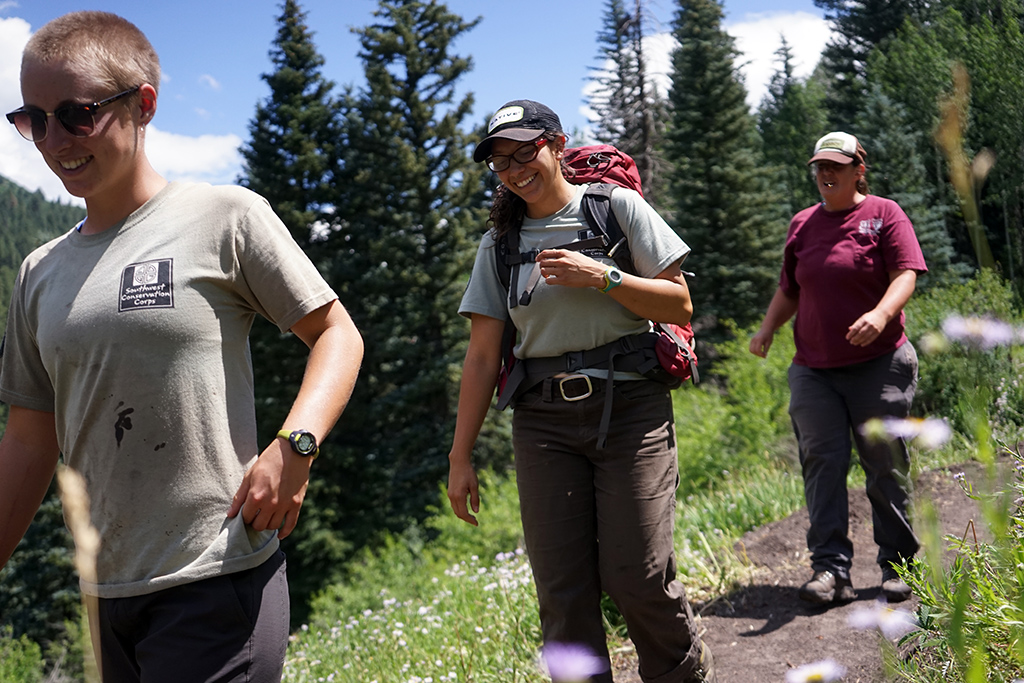
Alyssa Engdahl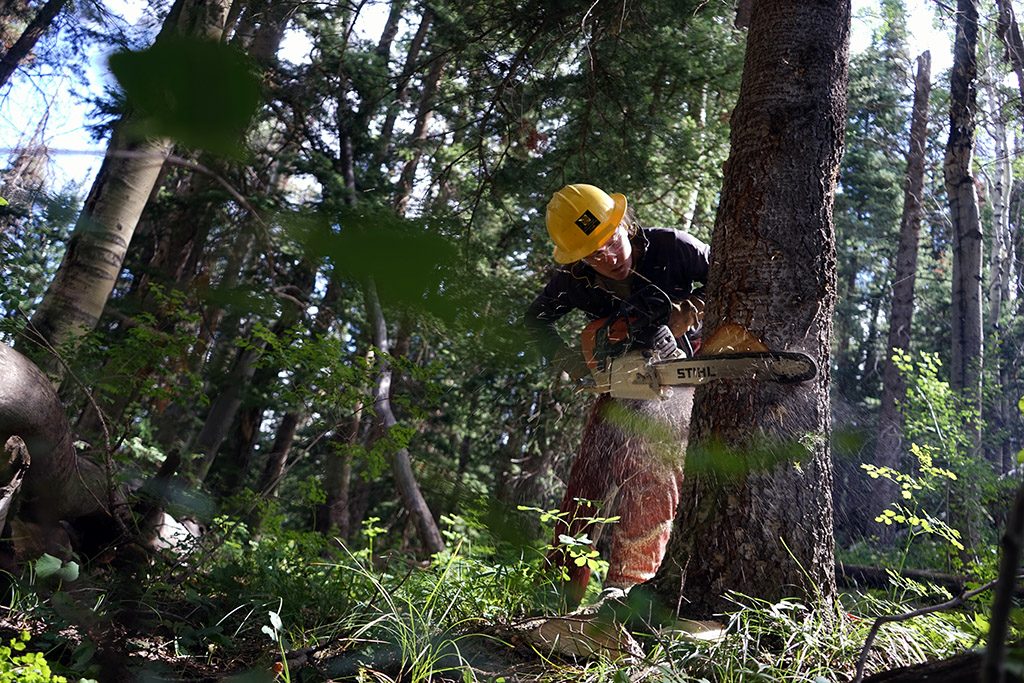
Alyssa cuts down trees like she leads, methodically, competently, and safely. Alyssa constantly emits immense amounts of experience on and off the trail and inspires those around her with her tenacity and drive.
Here Alyssa fells a tree to be used as a timber waterbar: a structure invisible to most hikers eyes which reinforces drains, ensuring longevity of the drain and preventing further erosion of the trail. This pine will produce three water bars and last about ten years.
After my first season of conservation corps, I swore I would never do it again. I enjoyed the work, but I struggled with the people and the total immersion into it. It was at a time in my life when I was struggling to figure out who I was and what I wanted. One thing that season taught me, however, was that nature was immense and a wonderfully magical place to explore. It was wide open and had welcoming arms.
After a year, I decided to give being a crew member another shot and finished the season absolutely in love with the corps world, Wyoming, and the path that I was headed down. I realized that this was a world I could thrive in. I was doing something that could make me feel happy and at at home.
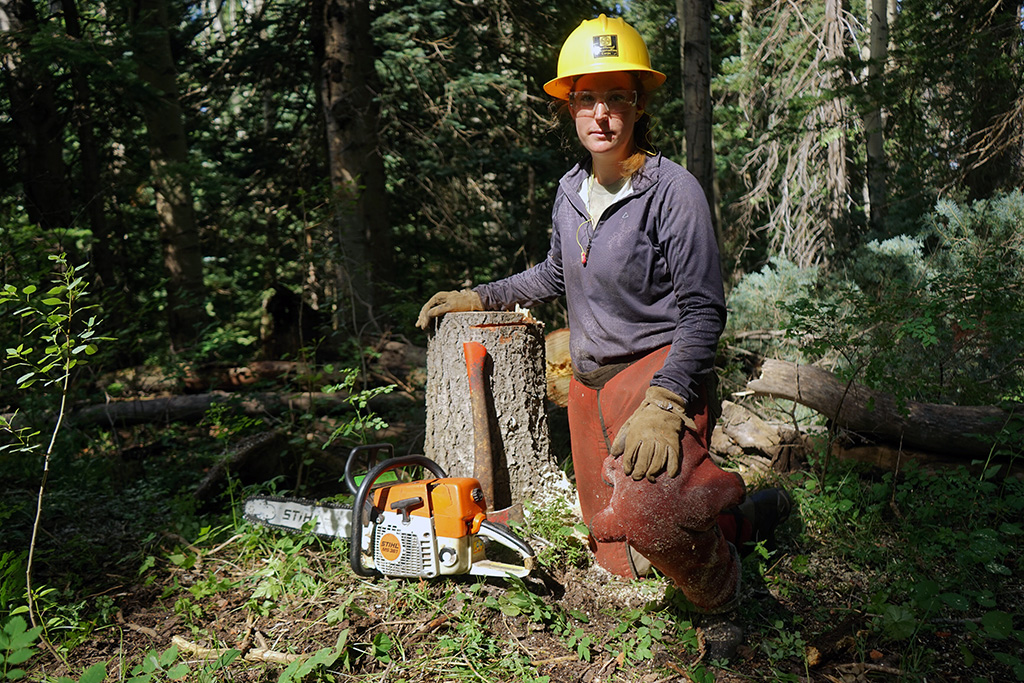
“My time in the corps and environmental world has had its ups and downs. I work in a world that had been commonly characterized as a man’s world. While this is still kind of the case, I and many other strong, smart, kind, inventive women are working our way into it and making it our place. In the trail world my gender doesn’t define or inhibit me; it enables me. I am a strong, confident, intelligent, driven woman, who strives to make a difference in the world.”
Ande Alvarez
Ande meticulously cuts the berm off of the trail, leaving behind a beautiful and more sustainable trail. Ande’s work stands testament to her passion for public lands and trails. Her vision and dedication help improve each trail she works on drastically.
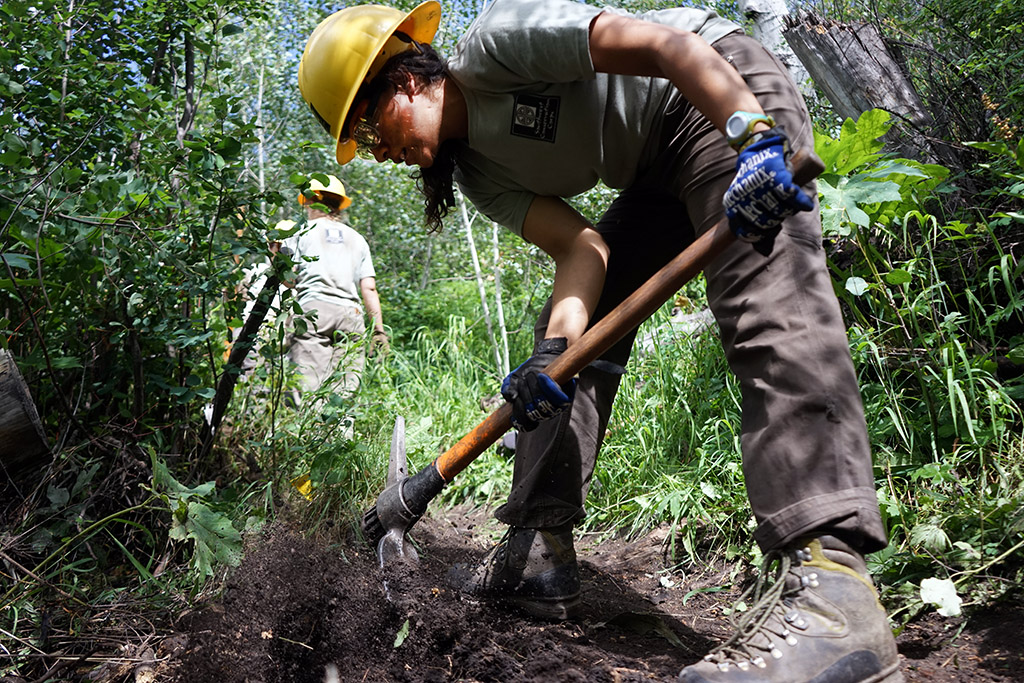
A little education for you non-trail folks: (The berm, soil that collects on the side of the trail, pools water and keeps it on the trail. From there the water can run down the trail, creating more erosion and social trails. Maintaining trails and creating more sustainable ones in the first place lightens our impact on public lands.)
One morning in September, on one of my days off from leading trail crews in the Bob Marshall Wilderness, I sat in the backcountry ranger station sipping my ground-filled coffee. This ranger station was a stopping point on the CDT and we had many hikers pass through daily. Most didn’t come in, or even say hi. They were usually just surprised to see other people. They would fill their waters and continue on their way.
On this morning though, a crustacean of a man walked up to the ranger station. We were instructed to be nice, offer coffee, and answer questions if we could. Being the morning person I am, I was prepared to offer hot coffee and some Oreo cookies to the traveler. I opened the door, and he exclaimed ‘I didn’t know y’all had women back here!’ As though we, women, were a treat of the rare sort to be found in the wilderness. Similar to the cookies I was about to offer him: a sweet treat for the taking.

“Being a woman in the wilderness is something that comes so effortlessly natural to me. I am constantly surrounded by mother nature, and as a woman, I feel at peace there. My senses seem to calibrate to the smells, the textures, the terrain and the temperatures that surround me.
“I’ve found myself in crowds of people who are of the opinion that women are delicate, weaker, and can’t thrive in the wilds. My reaction is usually a scowl followed by a smile; for they don’t know what I do.
“I know that I am a direct descendent of fierce women who have come before me, not taming the wilds — but finding their place within the trees, the streams, the ravines and the plains.”
Liz Cole
Liz started trail work in the Adirondacks. Through leading trail crews and saw crews this season in Southwest Colorado, she’s found a confidence that makes you put down whatever you are holding and listen. Her expertise is astounding, when she does share it is done with the utmost grace and poise. A polite spitfire.
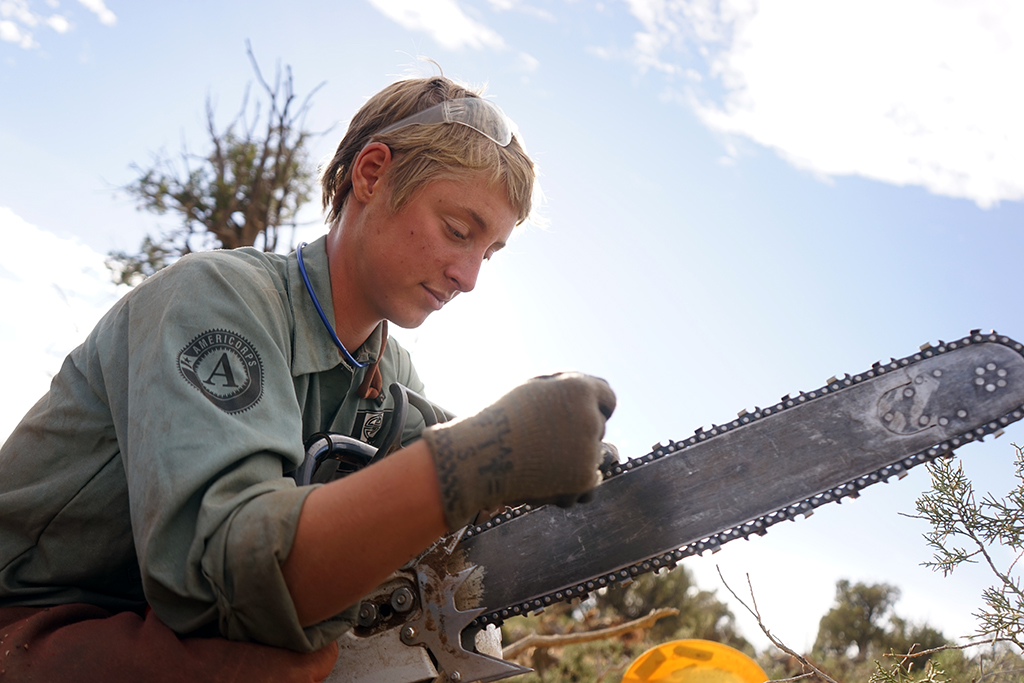
Here Liz Cole, Crew Leader at SCC sharpens her chainsaw in between trees. Routine maintenance of a chainsaw is essential to cutting projects. When you are using this tool for 8 hours a day, keeping it in good shape directly relates to production. It’s just good practice as well.
Completely oblivious to the struggles women face daily, I didn’t see the value in the feminist movement until college. Since I wasn’t being discriminated against, diminished, objectified, or assaulted, I didn’t understand what life was like for many other women. Now, surrounded by a group of strong, outdoorsy women with similar values, but wildly different backgrounds, I’m starting to see the bigger picture. I’m beginning to embrace my identity as a member of a community that has the power to uplift and inspire its members, and to change how society values women.
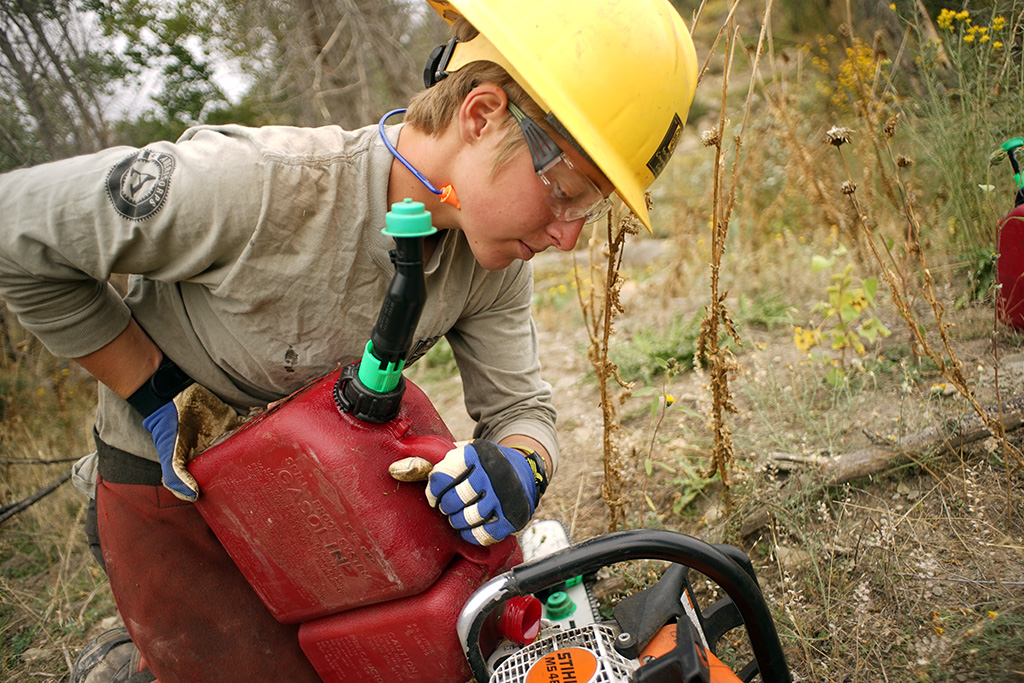
“Prior to this summer, I hadn’t given much thought about my identity as a woman, especially within the context of a larger female community. In fact, if someone asked me to describe myself, I’d likely list every other trait that describes me before listing ‘female.’ I’ve been incredibly fortunate in my life to be surrounded by strong, supportive role models (both female and male,) and have never felt pressured to conform to any rigid gender norms. (My aunt’s a pilot and my mom doesn’t wear makeup, for pete’s sake!) As a kid, my parents always encouraged me to pursue my interests, regardless of how un-feminine they seemed. I’ve always had the luck to be surrounded by people who are very concerned about my physical and emotional safety, so all my life I’ve lived in a sort of bubble.”
Megan Archer
Megan has lead long term backcountry trail crews in both Montana and Southwest Colorado. She is a passionate individual, passionate about feminism, the environment, and education. She’s a talented leader and one inspirational woman.
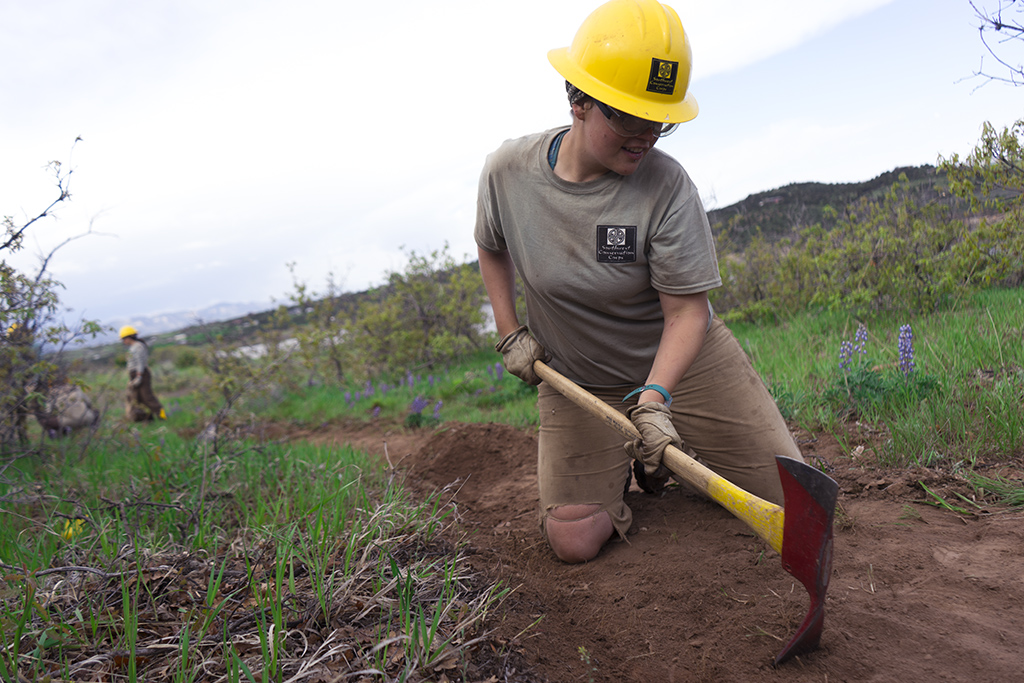
Here Megan is putting finishing touches on the tread (trail) with a pulaski, one of the last processes in building a new trail. Trail work these days, if it happens, is usually maintenance. Its rare to dig a brand new trail. But when it does happen it’s a true treat. Unfortunately, Public Lands budgets across the board are getting smaller and smaller; the remainder is increasingly going to fighting more frequent wildfires.
I think this work has changed how I feel as a woman. I have a friend who said once, this isn’t man’s work or woman’s work, this is people’s work, and I wholeheartedly agree with that. I feel like I go into every work day knowing that and even though I may have limitations as a person in certain things I don’t think it is because I am a woman specifically.
However, I do think this work has made me very conscious of being a woman. I find it fascinating that there are aspects of being feminine, it’s affected how I see women in this line of work. It makes me really conscious of how others see women in this work. I don’t feel as though I do work differently because I’m female. But saying that after being in this line of work that women who do this type of work are so in tune with themselves and their surroundings. Women who do outdoor work like this are fascinating creatures, because they have to be on top of things all the time.
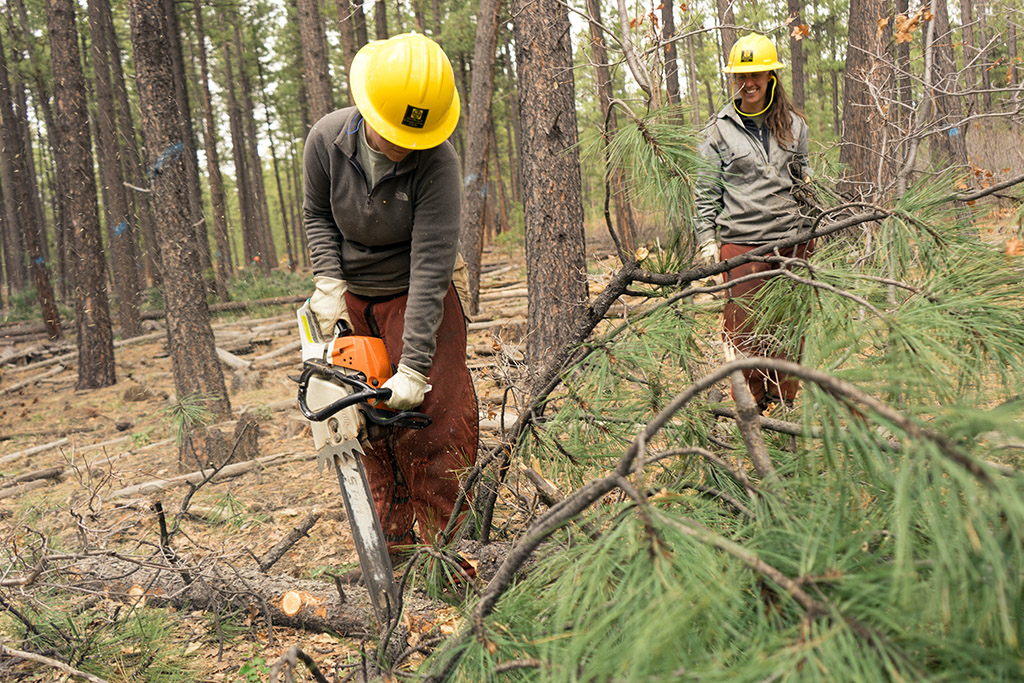
“In some ways I feel more womanly [doing trail work], but in other ways I feel much less feminine. Being out in the woods surrounded by mostly men, where you don’t have mirrors or the ability to really see yourself. You’re all wearing the same clothes, you’re all smelly, and you’re all working; it’s all about this different type of reality that American society is used to and in that way you can lose a lot of your feminine consciousness and how you see yourself as a woman.
“But on the other hand you have these comments of people saying [sexist] things about you as a woman, but then you don’t see yourself as a woman in this field. Because you’re not really treated like one but you are in some ways, so there are sexist comments which makes me feel uncomfortable but at the same time I’m just working, I’m working alongside you and I don’t feel really pretty or attractive but then you make these comments and then I’m subconsciously aware of how you see me in this field.”
Christy Harrington
Christy leads confidently and patiently, imbibing her members with her passion for the environment and trail work. A few years after college Christy quit her job at a DC company as a graphic designer, to follow this very passion. To her, it’s not a waste. She’s doing what she loves, what she finds important and fulfilling.
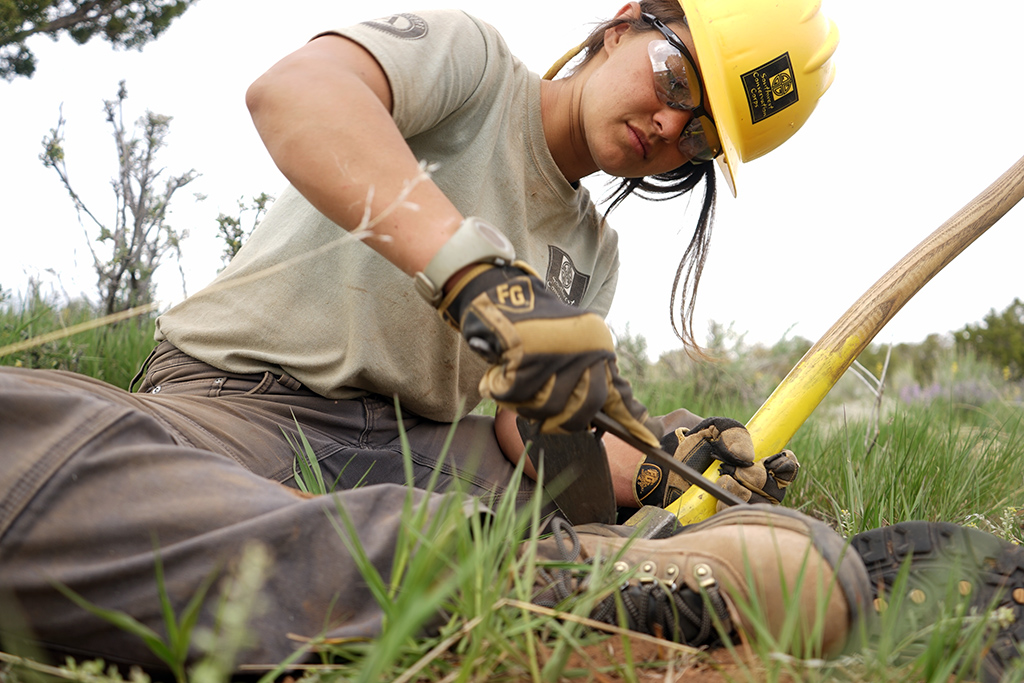
Here Christy sharpens her tool. Routine maintenance of trail tools, keeps them cutting sharply into the ground. If you have been digging in a particularly rocky area, your pick will show signs (little dings and mushroomed out areas) that it needs to be sharpened.
I know that I hold my own. I know that I have the same knowledge, I know that I have the same skills, as my male counterparts, but other people assume that I don’t for whatever reasons. I’m aware that other people assume that I don’t have the same skills and knowledge as men; I deliberately try not to let it change how I work, because I feel like by letting it change how I work I’m somehow giving weight to that opinion. But it is often frustrating, for example me and my co-leader Walker, walk up to project partner and ask a question about what we’re doing and the project partner just talks to Walker the whole time. I know that’s not deliberate, I also am generally more quiet. I’m more of a listener, Walker’s a talker; there are individual reasons I’m sure for why the partners would choose to talk to him more directly than they talk to me, I know it’s not completely because I’m a chick and he’s a dude, but I think it factors in. At the consistency with which it happens, it’s a factor. And that’s annoying.
But I’m going to work the way that I’m going to work and if someone has their own sexist opinions about women and trail work then that’s their problem. I’m not going to change my style of leadership or my style of trail work just because someone has an opinion and it is, frankly, wrong.
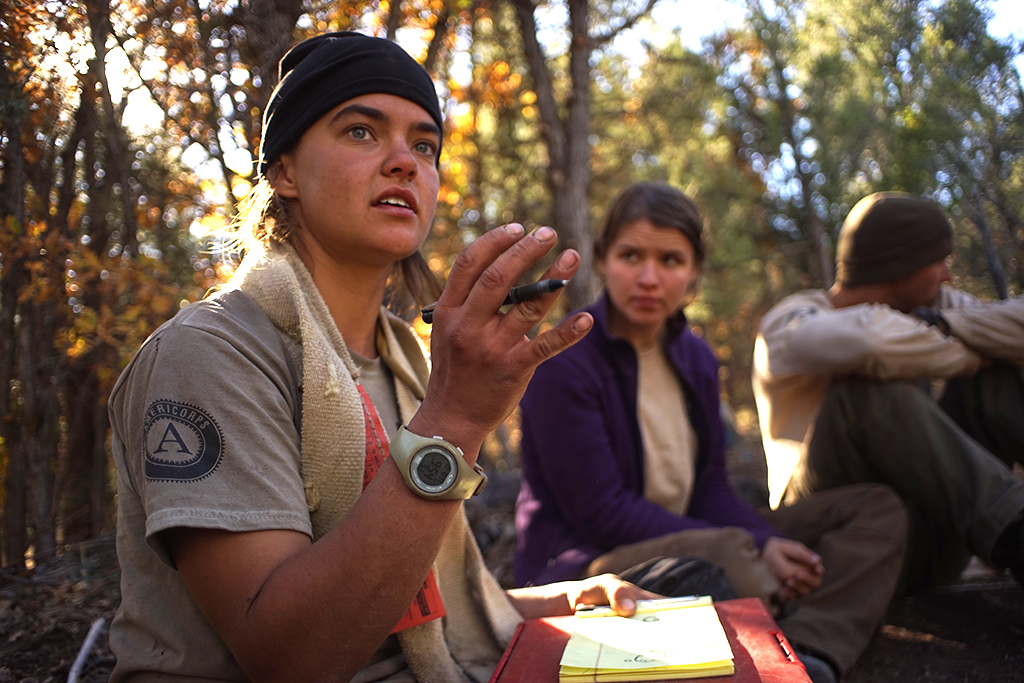
“First of all, I think trail work is important to me because its important. I have hiked in some places where the trails aren’t maintained. Actually a lot of places, trails are hardly ever maintained due to a lack of funding etc etc. But I’ve seen the negative environmental impact that comes from poorly maintained trails.”
For more information about trailbuilding and Southwest Conservation Corps, visit sscorps.org.
Sarah Hamilton is a photographer, filmmaker, storyteller, and trailbuilder. In her free time you can find her romping around the San Juans or climbing up desert towers. She resides in her polka dotted Subaru which is usually parked in Durango, CO. Be sure to follow her on Instagram and Facebook.
Be the first to comment